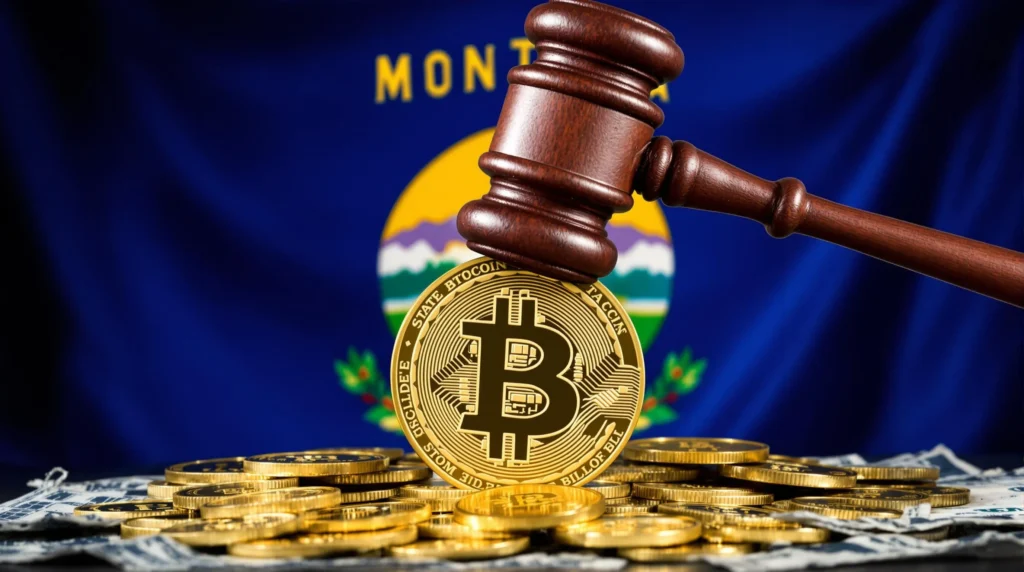Shocking Setback: Montana House Rejects Bitcoin Reserve Bill

In a surprising turn of events, Montana’s journey toward embracing Bitcoin as a state reserve has hit a significant roadblock. Despite growing enthusiasm for digital assets, the state’s House of Representatives recently voted down a groundbreaking bill that aimed to establish a Montana Bitcoin reserve. This decision has sent ripples through the cryptocurrency community, leaving many to question the future of crypto adoption in the Treasure State. Let’s delve into what transpired and what this means for Bitcoin and the wider digital currency landscape.
Why Did the Montana Bitcoin Reserve Bill Fail?
The proposed Bitcoin reserve bill in Montana was designed to position the state at the forefront of digital asset adoption. However, it faced considerable opposition during the House vote, ultimately failing by a margin of 41-59. Several factors likely contributed to this outcome:
- Concerns over Volatility: Bitcoin’s price volatility remains a primary concern for many lawmakers. Critics argue that holding a Montana cryptocurrency reserve in such a volatile asset could expose the state to undue financial risk.
- Regulatory Uncertainty: The regulatory landscape for cryptocurrencies in the United States is still evolving. Some lawmakers may have hesitated due to the lack of clear federal guidelines and potential future regulatory changes.
- Lack of Understanding: Despite increasing mainstream awareness, a lack of deep understanding about Bitcoin and blockchain technology among some legislators could have contributed to skepticism and a reluctance to embrace such a novel financial strategy.
- Political Divisions: Political ideologies and party lines can often influence voting patterns, even on issues that might seem non-partisan. Opposition may have stemmed from broader political disagreements rather than purely from the merits of the Bitcoin legislation itself.
What Was the Goal of the Montana Bitcoin Reserve Bill?
The intention behind the Montana Bitcoin reserve bill was ambitious and forward-thinking. Proponents believed it could bring several key benefits to the state:
- Economic Diversification: Holding Bitcoin as a reserve asset could diversify Montana’s financial holdings, reducing reliance on traditional assets and potentially acting as a hedge against inflation.
- Attracting Innovation: Embracing Montana cryptocurrency initiatives could attract blockchain and cryptocurrency businesses to the state, fostering innovation and creating new economic opportunities.
- Enhanced Reputation: Becoming a state with a Bitcoin reserve could elevate Montana’s profile as a tech-forward and progressive jurisdiction, drawing positive attention and investment.
- Future-Proofing Finances: In an increasingly digital world, incorporating Bitcoin into state reserves could be seen as a proactive step towards future-proofing Montana’s finances and adapting to evolving economic paradigms.
The Broader Implications for Bitcoin Legislation and Crypto Regulation
Montana’s rejection of the Bitcoin legislation is a significant event within the broader context of crypto regulation in the United States. It highlights the ongoing debates and challenges faced by states considering embracing digital assets at a governmental level.
| Aspect | Implications of Montana’s Rejection |
|---|---|
| State-Level Adoption | May slow down momentum for other states considering similar Bitcoin reserve initiatives. Could signal increased caution among lawmakers. |
| Federal Regulation | Underscores the need for clearer federal guidance on cryptocurrency regulation to provide states with more certainty and encourage responsible innovation. |
| Public Perception | May reinforce existing skepticism about Bitcoin’s viability as a mainstream financial asset among some segments of the population and policymakers. |
| Industry Advocacy | Emphasizes the importance of continued education and advocacy efforts by the cryptocurrency industry to address concerns and build trust with lawmakers. |
What’s Next for Montana and Crypto Adoption?
Despite this setback, the journey for Montana cryptocurrency adoption is far from over. Here are some potential future pathways:
- Re-evaluation and Revision: Proponents of the bill may revise and reintroduce a modified version in future legislative sessions, addressing the concerns raised by opponents.
- Focus on Education: Increased educational initiatives aimed at lawmakers and the public could help foster a better understanding of Bitcoin and its potential benefits.
- Pilot Programs: Instead of a full reserve, Montana could explore smaller-scale pilot programs to test the feasibility and benefits of incorporating Bitcoin into state finances in a more controlled environment.
- Private Sector Growth: Even without a state reserve, Montana can still foster a thriving cryptocurrency ecosystem by creating a business-friendly environment for crypto companies and miners.
Conclusion: A Temporary Setback, Not the End of the Road
The rejection of Montana’s Bitcoin reserve bill is undoubtedly a disappointment for crypto enthusiasts and advocates of digital asset adoption. However, it’s crucial to view this as a temporary setback rather than a definitive end. The conversation around Bitcoin and cryptocurrency within government is still in its early stages, and decisions like this are part of the learning and adaptation process. Montana’s experience provides valuable lessons for other states and underscores the ongoing need for education, dialogue, and careful consideration as we navigate the evolving world of digital finance. The Montana Bitcoin reserve idea might be down for now, but the underlying drive for innovation and financial evolution in the digital age remains strong, and the future of Bitcoin legislation is still being written.









